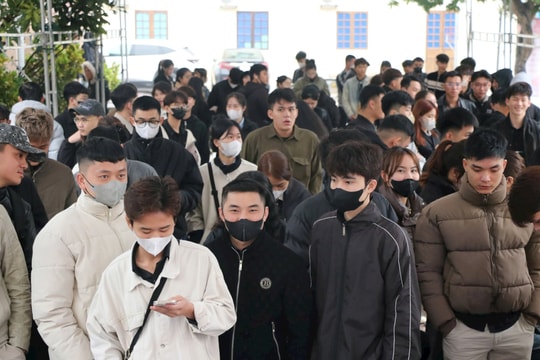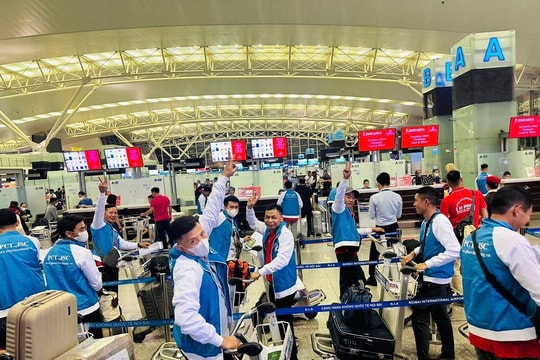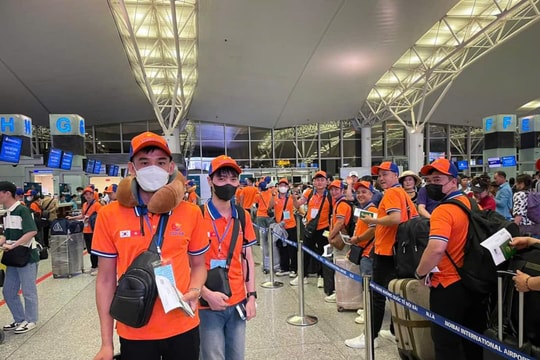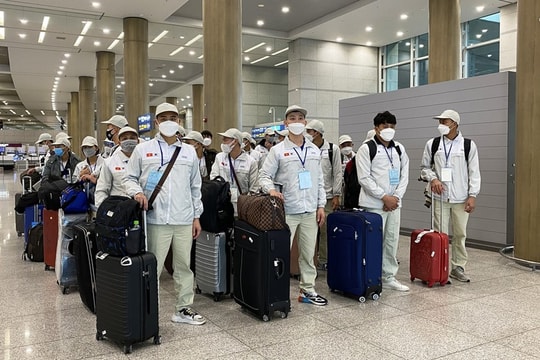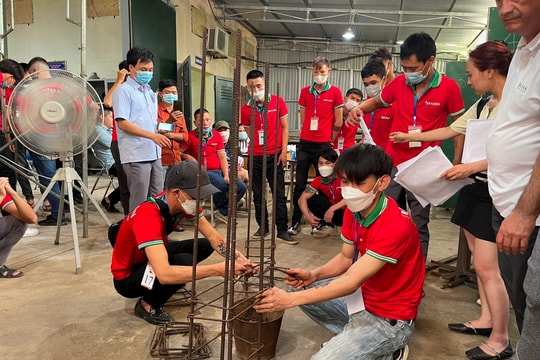Illegal workers in Korea: Don't let 'the oranges suffer the consequences'
(Baonghean.vn) - In the announcement of the Ministry of Labor, War Invalids and Social Affairs to temporarily suspend the recruitment of workers to go to Korea for 8 districts nationwide, Nghe An has 3 districts including Nghi Loc, Hung Nguyen, and Cua Lo town. These are all localities with the number of illegal workers residing in Korea from 70 people or more and the rate of workers whose contracts have expired and do not return home on time is from 27% or more.
"The orange must suffer the mandarin orange"
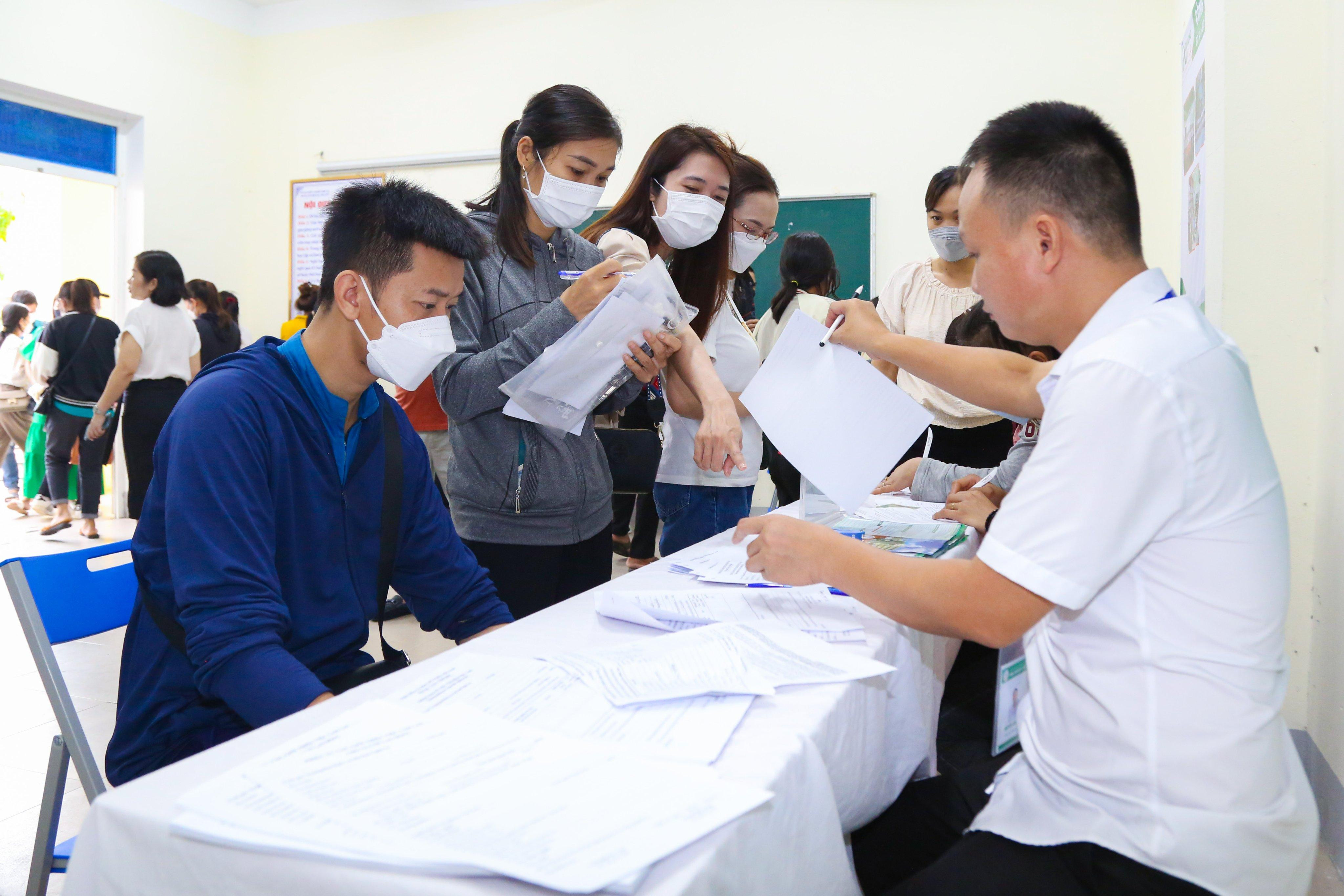 |
Workers learn about opportunities to go abroad at the August job fair held at the Provincial Job Center. Photo: Dinh Tuyen |
Mr. Tran Dinh Vinh, residing in Nghi Thiet commune, Nghi Loc district, had worked in Korea for many years under a contract. Earlier this year, when his term expired, he had to return home because the other side did not have an immediate extension policy. At this time, introduced by a friend, he jumped out with the hope of staying for as long as possible, earning more income to stabilize his life later. In his group, there are currently 7/10 people whose terms have expired but who have stayed behind. According to Mr. Vinh, most workers from Nghe An and some other areas who go to Korea want to stay as long as possible, although they realize that if they do not return according to the contract, others cannot go.
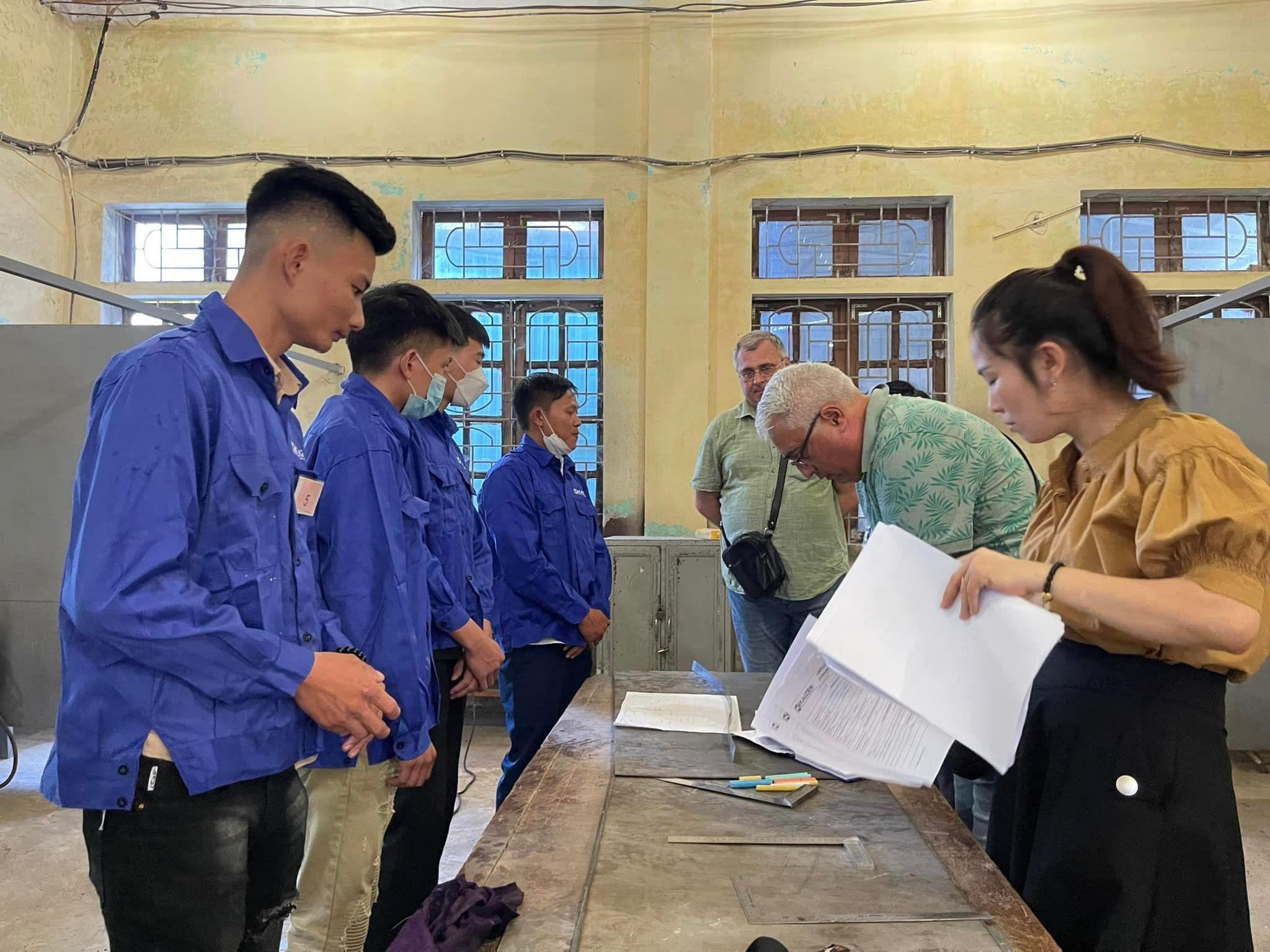 |
Workers participate in exit interviews to high-income markets. Photo: CSCC |
Not only Vinh, in Nghi Thiet area, there are 4 workers who are reported to be residing illegally in Korea. After many efforts to persuade and mobilize, up to now, 3 workers have returned to Vietnam. Mr. Nguyen Van Hanh, a worker returning from Korea, said that illegal residence is also a last resort, because most of the workers who go under this category are in difficult circumstances and have high exit fees. Many people even "mortgage their red books" to borrow money from banks to cover the exit fees. "After only 4 years and 10 months of going, I did not earn much even though the income in Korea is quite high, so the mentality is that when the contract ends, everyone wants to go out to work illegally, and when they are caught, they can go home at that time," Mr. Hanh confided and said that the reason he voluntarily returned home after a period of working illegally was to create an opportunity for his cousin to have the opportunity to go to Korea to work.
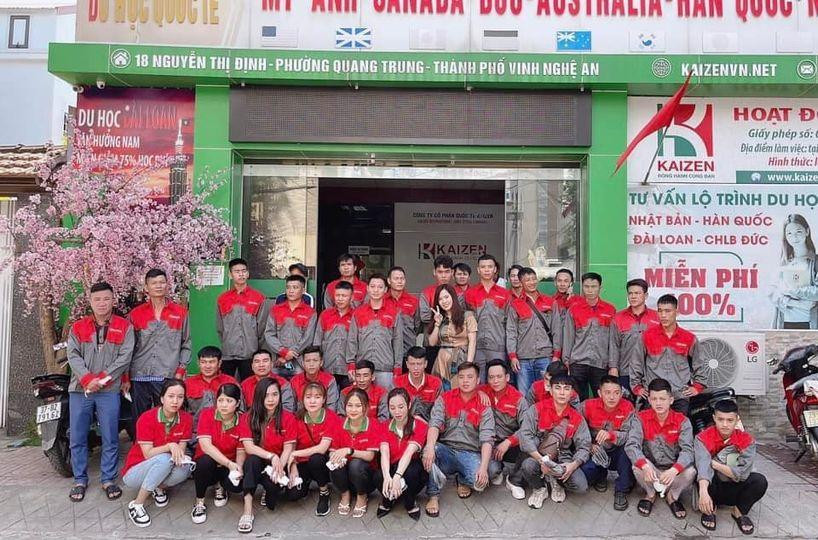 |
Workers who have applied to work in Korea and other high-income countries are waiting to leave the country. Photo: CSCC |
Most illegal workers in Korea know that by staying illegally, other workers in their home country will not have the opportunity to go to Korea. The Ministry of Labor-The Department of War Invalids and Social Affairs recently announced a temporary suspension of recruitment of workers to Korea by the three localities of Hung Nguyen, Nghi Loc, and Cua Lo town, causing many people to fall into difficult situations because they had completed the procedures and financial obligations, waiting for the departure date but were temporarily suspended.
According to Mr. Nguyen Tien Dung - Deputy Head of the Department of Labor, Invalids and Social Affairs of Nghi Loc district, the district currently has up to 230 workers residing illegally in Korea. If in the coming time, these workers do not voluntarily return home, Nghi Loc will continue to be the locality with the longest time on the blacklist of Korea under the EPS program.
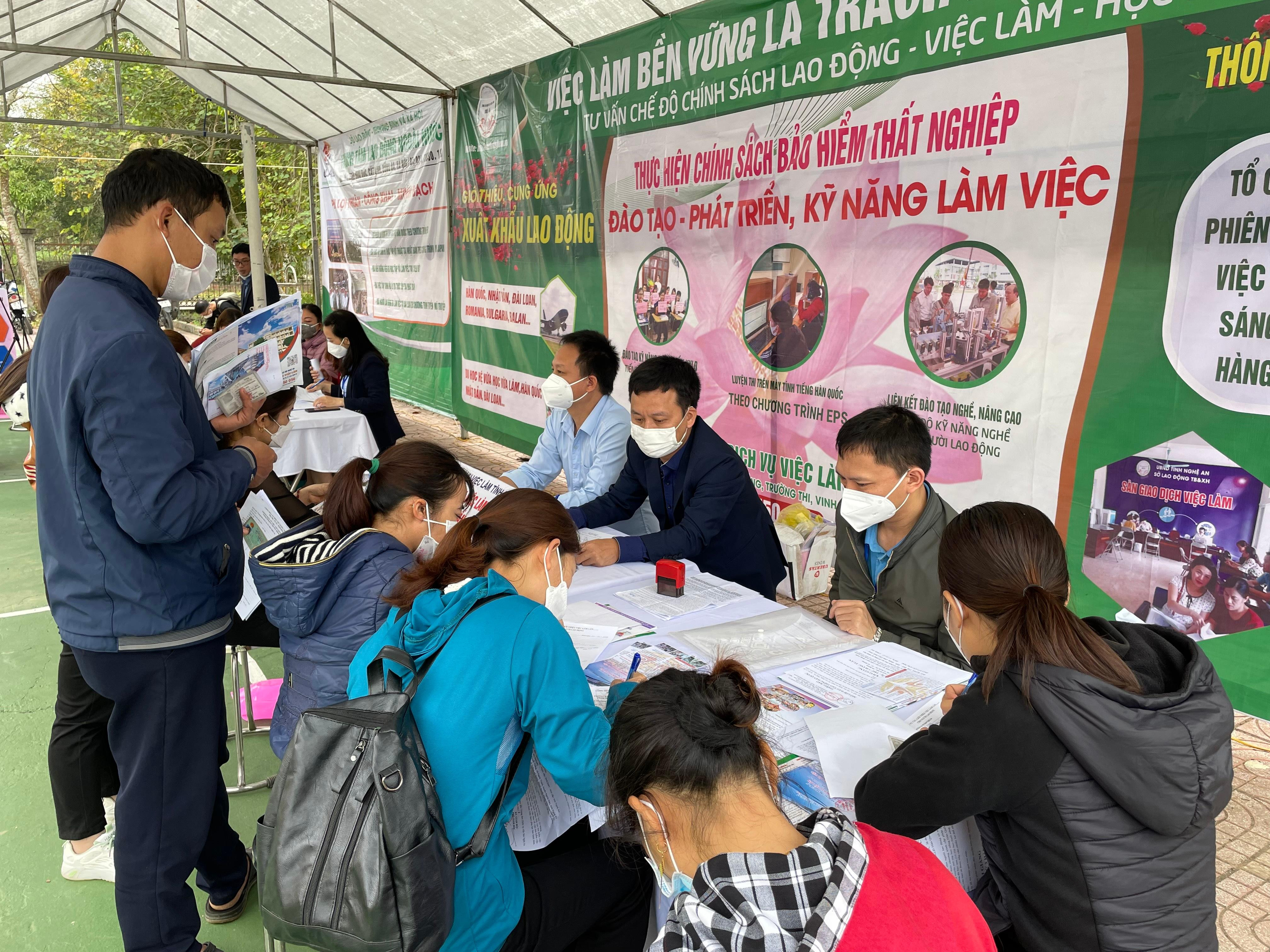 |
At the job fair held in Nghia Dan, many workers were looking for opportunities to work abroad in high-income countries. Photo: CSCC |
Like Nghi Loc district, Cua Lo town is a locality that has been "named" because of the large number of illegal workers. Recently, Cua Lo town has issued an official dispatch directing localities to call on children who are working illegally to return home. Mr. Nguyen Duc Lam - Chairman of Nghi Tan Ward People's Committee, Cua Lo town said: Calling on children to return home when their contracts expire is very difficult, but we determined that it is difficult but we have to do it because if these people do not return, the next generation will not have a chance. We cannot let "the tangerine make the orange suffer" forever.
Need strong enough solutions and sanctions
The situation of Nghe An workers working in Korea arbitrarily changing their workplace, not returning home on time according to the contract, staying in Korea to work and residing illegally has been going on for more than 10 years. This is also a common situation in many localities across the country. Korean authorities regularly conduct reviews and issue warnings, temporarily suspending the implementation of agreements on dispatching Vietnamese workers in some localities. In these reviews, Nghe An is always one of the provinces with the largest number. This has greatly affected the labor cooperation between the two countries and deprived the rights of other workers who wish to work in Korea under the EPS program.
In recent times, the authorities and localities in the province have implemented many solutions to mobilize workers to return home on time. Thanks to those efforts, the number of Nghe An workers residing illegally in Korea has decreased. In the 2017 review, Nghe An had 11 district-level localities where the Korean side temporarily stopped recruiting workers, but in 2022, there will be only 3 localities: Hung Nguyen, Nghi Loc, and Cua Lo Town.
Mr. Tran Phi Hung - Head of the Department of Labor Safety & Employment, Department of Labor, Invalids and Social Affairs of the province said: The viewpoint of the Department of Labor, Invalids and Social Affairs and all levels and sectors is to resolutely handle and propagate to quickly reduce the number of illegal workers in Korea. In the past time, the Department has coordinated with the district level to organize many activities and forms of mobilizing workers to return home according to regulations. Communes directly work with families with illegal workers or workers whose contracts are about to expire so that the families are responsible for encouraging and persuading their children working in Korea to return home on time. At the same time, do not confirm the records and necessary procedures and papers of workers who register to work in Korea when these workers have siblings residing illegally in Korea...
According to Mr. Hung, there are many reasons why workers who come to Korea stay illegally. Besides the subjective reasons of each worker, there is another reason that Korean enterprises want to avoid and reduce the costs of recruiting new workers and want to reuse Vietnamese workers who have already mastered the work they did before, so they create conditions for workers to stay and work illegally.
In addition, the management of foreign workers working from Korea is not strict; the household registration management agencies such as the Police, the Police, and the Justice Department do not have synchronous coordination and the sanctions are not strict, so Vietnamese workers can easily take advantage of loopholes to avoid the authorities to stay and work illegally.
“Moreover, propaganda and mobilization solutions are mainly implemented domestically, while workers working in Korea face many difficulties in accessing information,” Mr. Hung shared.
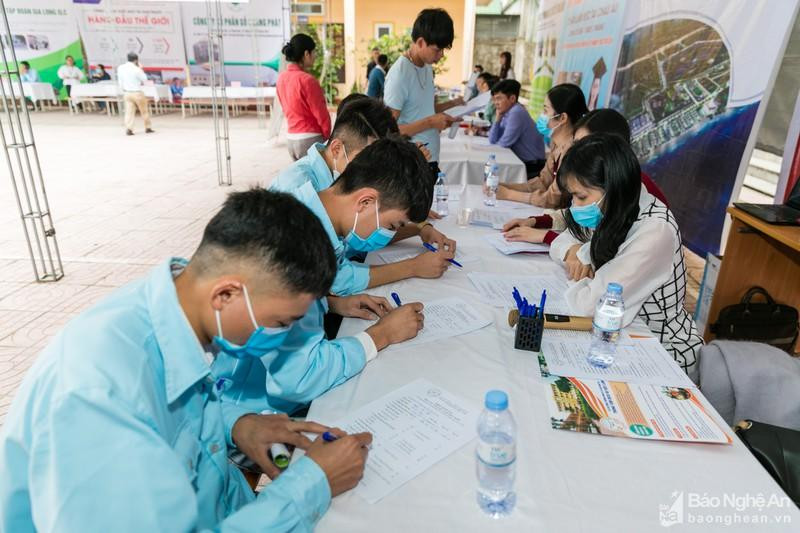 |
Many skilled workers want to have the opportunity to access high-income markets such as Korea and Japan. Photo: Duc Anh |
To effectively reduce illegal labor, the representative of the Department of Labor, War Invalids and Social Affairs said that functional agencies such as the Ministry of Labor, War Invalids and Social Affairs, the Department of Overseas Labor Management, the Korean Embassy in Vietnam, all levels, sectors, localities, socio-political organizations, communities, and enterprises need to actively participate in propaganda work, providing full information in many forms on policies, laws on labor export and regulations guiding the program of sending Vietnamese workers to work in Korea; improve the quality of selection and training of workers before they go to work in Korea, ensuring that they meet the requirements on skills, foreign languages, and awareness of law compliance, labor discipline, labor contracts, etc.


